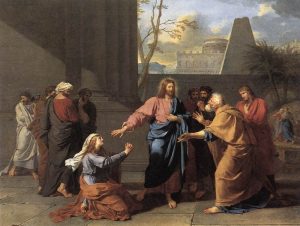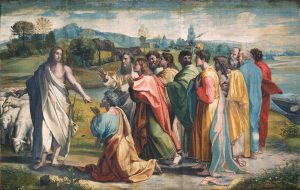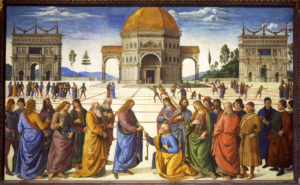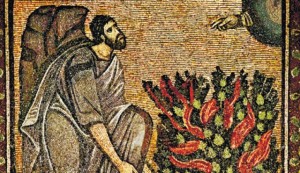Illuminations on the Lectionary readings for Aug. 20, 2023 (Pentecost 12A)
First Reading (Track One): Genesis 45:1-15
The idea of generous mercy recurs through Sunday’s Track One Lectionary readings as we near the midpoint of the long season after Pentecost, and at this point the direction of the selected readings start to turn.

La Cananéenne aux pieds de Jésus-Christ (The Woman of Canaan at the Feet of Christ, 1784), oil painting by Jean Germain Drouais (1763–1788). The Louvre, Paris. (Click image to enlarge.)
In the Gospel for the day we will see Jesus and his apostles leaving Galilee as, in Matthew’s telling, they begin ] their long journey toward Jerusalem and the cross. First, though, our reading from the Hebrew Bible finds Joseph in Egypt, where we will soon turn from the patriarchs to Moses and the story of the chosen people. Joseph has been through a lot since his jealous brothers sold him into slavery. He has become a chief advisor to Pharaoh, which gives him great power over his brothers who have come to Egypt in a time of famine. In a tearful reunion, Joseph forgives them, and the ancestral line that points to the Messiah remains unbroken.
First Reading (Track Two): Isaiah 56:1,6-8
Sunday’s Track Two first reading turns to the closing chapters of Isaiah’s long book of prophecy. The people have returned home to Jerusalem, and now they face the arduous task of rebuilding the city and the temple. Isaiah reminds the people that, just as they lost the land for their failure to be righteous and just, they may no longer keep the holy city for themselves alone, even though they “maintain justice and doing what is right.” The covenant that God made with Moses is now for all people, for all the nations. Even foreigners and aliens who hold fast to the covenant principles will be gathered in, welcomed in the temple and made joyful. We will hear Jesus echo this refrain in Sunday’s Gospel when he overcomes his initial aversion and recognizes the Canaanite woman’s faith.
Psalm (Track One): Psalm 133
In this short, ancient hymn of praise, the Psalmist exults in the blessedness of siblings coming together in unity. In verses that foreshadow Paul’s words in the day’s Second Reading, urging the Christian community of Rome to come together in friendship, the Psalmist sings how good and pleasant it is when families and friends live together in the blessed spirit symbolized by anointing with fine oil.
Psalm (Track Two): Psalm 67
We hear again a Psalm that we sang this year toward the end of Eastertide, just before Pentecost Sunday. Psalm 67’s verses both echo the Isaiah reading and foretell Paul’s verses from Romans in its joyous call to all the nations of Earth and all their people to sing together in peace and praise. Let all the nations praise God and pray for God’s blessing, the Psalmist sings: It is through God the earth gives forth its bounty, whereupon all Earth sings out its praise.
Second Reading: Romans 11:1-2a, 29-32
Paul expands on his invitation to Rome’s Jewish and Gentile Christians to resume close relationship after the Jewish Christian community returned to Rome from exile. Here Paul emphasizes his own Jewish heritage, pointing out his status as an Israelite and a direct descendant of Abraham through Benjamin, the youngest brother whom Joseph loved. God’s promises to Israel will never be revoked, Paul declares, and God’s new promises to the Gentiles are just as irrevocable. Regardless of our disobedience, our sins, and our ancestry, God is merciful to us all and loves us all.
Gospel: Matthew 15:10-28
First in Sunday’s two-part Gospel we encounter Jesus mocking a group of Pharisees who in previous verses had criticized his disciples for ignoring the ritual requirement to wash their hands before eating. Jesus offers an earthy response: What goes into our mouths – even food from unwashed hands – does not defile us. It’s the words that come out of our mouths that show our true character. Then, in the land of Canaan, Israel’s traditional enemy, Jesus shocks us again: When a Canaanite woman seeks help for her demon-tormented daughter, Jesus first ignores her, then replies with a startling insult, likening her children to stray dogs scrounging for crumbs under the table. But the words that come from the mother’s mouth come from her heart. The encounter changes Jesus: He praises her faith and heals her child.



